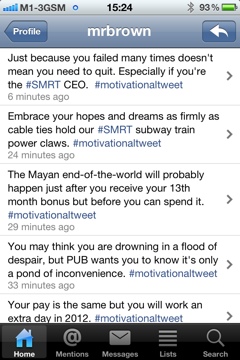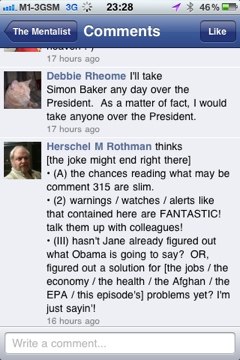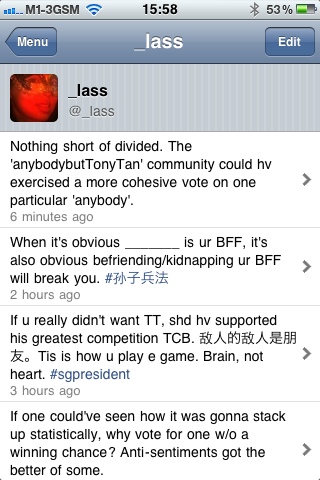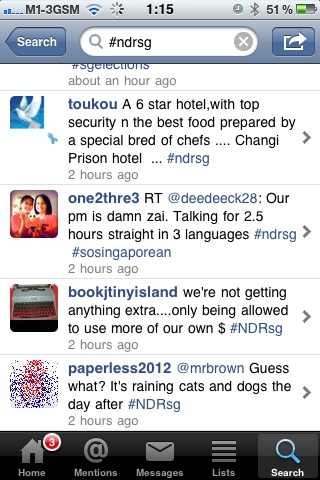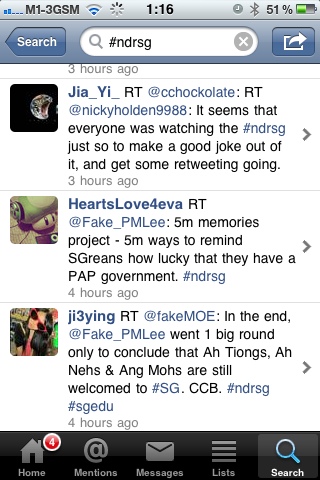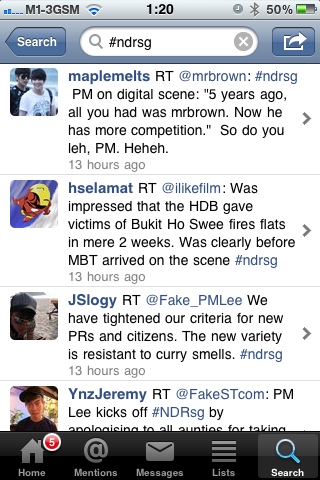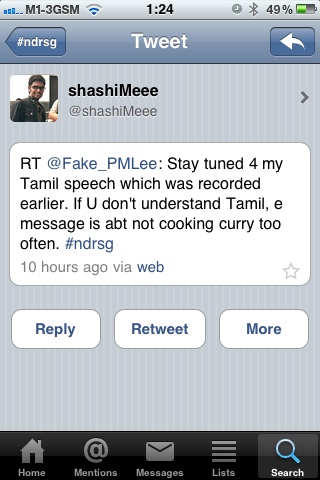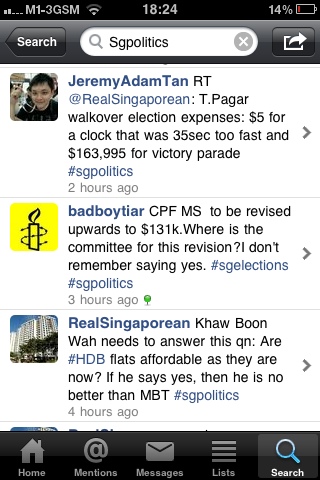Fan Those Flames
Singapore Presidential Election 2011
Post National Day Rally
Dear & Javier Agree(sorta) on ERP
http://www.straitstimes.com/STForum/Story/STIStory_674301.html
Me to Dear: hey, finally someone says that ERP helps, like you.
Dear: it’s because we are not paying on a daily basis that we don’t feel the pinch to pay this premium for smooth traffic. To the people who have pay to go to work everyday, it’s very ‘shiong’.
Classic Dear’s style: the moment you agree with or supports him, he switches side, counters and stand by those unlike him(us).
I’ve been down that road, utilizing the expressways around 8ish on the morning. Paid a total of S$5+ on the CTE and nothing on PIE. Ironically, CTE was where I experienced congestion, not the PIE.
Come 10am when all gantries retreat into standby mode even in the CBD, the slip road from PIE to CTE towards city can add quite a number of minutes to one’s journey.
And then there have been times around 5pm when I embark on the CTE, pay ERP and traffic’s good.
9.30pm comes around, when many would be heading home after overtime or dinner+movie, one still has to pay ERP on CTE with certainty of slow traffic.
Before I go further, I do think that ERP beyond 7pm or 8pm is ridiculous. And for it to go all the way to 11pm, it truly is blood-sucking.
Do I have a better solution? No. Because even in countries with abundant land, one has to pay tolls and CBD charges and still be subjected to traffic congestion as long as you choose to head towards the bustling city the same time as most people. Work around it or be a part of it. If you can’t beat them, join them.
But we put ourselves there – by choice or not.
Is the car a want or a need?
Is it not our choice to sleep in and be a victim of higher ERP? Can we opt to wake earlier so as to not pay or pay less?
I’m not saying that after 13-16 years of studying and then landing a decent job, one is not entitled to a luxury or two. We are totally entitled to succumb to our desires and subject ourselves to the premium borne. However, this luxury is one which eats into a luxury that Singapore does not have: land.
Just because every other person you know owns a car does not make it less of a luxury or more affordable. If anything, it probably makes the acquisition of one a more desirable status than ever.
It’s our choice to soak in Orchard Road after work, on weekends, during GSS and festive seasons knowing full well the parking and ERP charges, is it not?
We do have heartland malls with increasingly more desirable tenants sprouting to decentralize shopping and entertainment, no?
Yes, The People Are Guilty of Double Standards TOO
ONESINGAPOREAN urges WP supporters to get a grip
Exhilarating read: onesingaporean warns WP supporters against becoming an embarrassment
If I were to quote the parts I like, 9 out of the 15 paragraphs would appear here.
Catherine Lim on the Real Winners of GE2011
Boy, can this woman write. Long readable articles are not easy to do.
Paragraph 7:
If the people had wondered about their gains in GE 2011, they could not have been given more concrete evidence of it. For they had virtually been handed them on a plate, like a winner’s glittering trophies. Never had any PAP commitment been more unequivocally given, in terms of its wide media coverage, high public visibility and its setting the stage for full transparency and accountability. It was as if the PAP, once they had made up their minds, wanted no half measures. Even skeptics must admit that if there is disappointment with the actual outcome of the review, it can only be with the details, not the substance.
At paragraph 23, I thought I was nearing the end of the post, only to realise that it was only the start of her sharing.
Paragraph 26:
Since the guidelines are going to play a significant part in my deliberations over the coming months as I watch the political scene, I have put them in the form of simple personal self-instructions and resolutions (rather like reminding notes stuck on desks and mirrors!):
1) watch closely to see if the GE 2011 commitments made by the PAP leaders translate into action, but also be aware that just as they have promised to listen to us, we should endeavour to listen to their explanations about constraints faced, and problems encountered. Some promised corrections can be made easily; others will take time and may even be made extremely difficult by conditions outside their control. As long as there is honesty, transparency and accountability on their side, there should be understanding and patience on ours.
2) understand that there is a price to be paid for the democratic gains of freer expression and open debate. The cost can be seen in two situations:
a) More noise and disorderliness in parliamentary debates, taken up and amplified in the Internet and social media. But, provided that there is no violence and threat to our security, we should be prepared to accept that some messiness is good for the political education and exposure of young Singaporeans.
b) the stronger opposition voice which may cause delays in the implementation of an important policy, resulting in public loss of time, convenience, opportunity etc. But it should still be seen as a worthwhile trade-off for the democratic gain of open, public debate and criticism without which democracy’s prized tool of the checks and balances of power can never be utilized.
Overall, there will have to be a constant balancing of the pros and cons of democracy as applied to the Singapore context. Hopefully, our relationship with the PAP leadership will not be confrontational, but a continuing dynamic of robust engagement. The ultimate gain is the evolution of our own model of democracy, in keeping with the special socio-political character of our society, continually adjusting to the changes of a world in flux, in order meet the special needs and aspirations of its people.
3) encourage fellow Singaporeans, especially the younger generation, to make full use of the various channels of communication and feedback provided by the government to speak up, even on issues previously deemed sensitive, out-of-bounds, or taboo (I will make use of the snippy, snappy advice I once gave to a group of Singaporean university students: ‘Think through, speak up, stand up, and try not to be too afraid!’)
5) endeavour to set a tone of respect and courtesy in all political commentaries, no matter how strong the criticism; brutal honesty and polite delivery can actually go together.
6) above all, set an example of open-minded, honest, reasonable, sensible and responsible behaviour for young Singaporeans who will form the future citizenry. That means that whatever remains of the rancour, meanness, disingenuousness and blustering of the GE 2011 hustings must be permanently left behind.
Don’t ask me what happened to point number 4, it was never there in the first place.
Cynicism – PAP’s main battle
In the meantime, I would encourage cynics to not be too quick to dismiss PM Lee’s promise. Give him time. Reform, in this case, means changing current ways of doing things, of adopting new belief systems, and of painting new landscapes of the future. It means the PAP having to change in five years what it is accustomed to the last 50 years. It’s no small feat.
But change it must, of course. If PM Lee does not keep his word, then perhaps it won’t be too late to register your displeasure when the time comes.
You will have an opportunity to do this, for sure.
And PM Lee knows it too.
In the meantime, lets hold off the cynicism.
Seriously, let’s heed theonlinecitizen’s call and not let cynicism be our first reaction to every PAP action and/or proposal. Too much skepticism blinds us from the change that is happening, the changes we’ve been yelling for.
TODAY: Besides ERP, any other solution?
Letter from Matthew Yap | May 30, 2011 6:00
I REFER to the report that the Land Transport Authority (LTA) is looking into the possibility of implementing a new Electronic Road Pricing (ERP) system (May 25).
I would like to share my views on the issue of traffic congestion that the ERP system was introduced to tackle.
First, on the width of expressways. I am thankful that the LTA has been adding lanes to the Central Expressway (CTE).
However, the LTA should study the cost-benefit analysis of building highways with seven to eight lanes in each carriageway vis-a-vis a three or four-lane one and adding lanes regularly.
There is room for expressways like the Kranji Expressway (KJE) now but this pre-emptive move is lost when housing is built.
As a business development director for a multinational company, I travel widely and often marvel at highways that cope with heavy traffic flow. The Middle East countries have a lower traffic volume than Singapore but they build highways with seven-lane carriageways at the outset.
This means there is no need for any road work in the short to medium term to cope with any increase in traffic.
As for optimising existing road use, I was impressed by the introduction of an Olympic lane for tournament vehicles during last year’s Singapore Youth Olympic Games.
The optimal use of roads by time and space offers a strategy to regulate traffic flow.
Jakarta requires there to be three persons per car in order for them to use the highways during peak evening traffic. California requires there to be two persons per car in order for them to use the overtaking lane. The penalty for breaching the rules is a punitive fine.
In Singapore, a noticeable difference should be apparent in a short span of time. The land available is largely fixed but the flexible use of roads can help.
The issue of car ownership has brought about much debate in the press and among netizens as to what is fair, and what loading or taxes to introduce for second or third cars.
My take is that a world-class public transport system does little when many people load the system during the morning and evening peak hours.
I am certain the LTA can learn a lot looking at the road policies employed in the Middle East, Europe and the United States.
It should gather feedback from the public before going ahead with a potentially expensive ERP exercise trial that may turn out to be yet another exercise in futility.
______________
10th paragraph reminds me of carpool exclusive lane encountered in most recent driving experience in USA.
2 things:
1. effectiveness?
2. the how-to of determining ‘car-pool status’ by the authorities <- either too manual/labour intensive or too advanced
